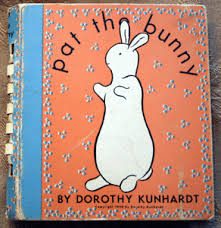
I recently grappled with the deeply disturbing 1940 psychological thriller by Dorothy Kunhardt entitled, “Pat the Bunny.”
The sense of malaise begins with the title of the book. Is it a charming story about a rabbit named Patrick? No! The title is a command, much like “Toe the line” or “Fear the Reaper.” What if I do not want to pat the bunny? What if I am deathly allergic to rabbit fur? We have no choice in the matter, we must pat the bunny.
Once inside the front cover, the reader is confronted with an interactive assault on the senses. We are commanded, in all capitals, to look at this, smell that, touch this, and to listen to the sound of our voices as we are urged to read aloud certain passages. The only sense not included is taste. Nowhere is the reader instructed to taste a page. Then again, we are never explicitly instructed NOT to taste a page, so perhaps one has choices after all, if one digs deep enough. If one dares.
One directive that is truly disquieting is to feel daddy’s scratchy face. It is indeed scratchy, too scratchy. In fact, it is unnaturally scratchy, leading us to wonder if daddy is not of this earth. One begins to question all the things that they had previously accepted as true and comforting. This feeling is compounded when we consider the earlier requirement to look in the mirror. The image we see is distorted and vague, much like our current perception of reality, and our memories of the past.
There was no sleep that night.
Shortly thereafter we are confronted with an additional book within the book. Riddles within riddles. The book is simply entitled “Judy’s Book”, and again we are ordered to read the tiny tome. The message? Judy can read the book, and so must you. If you do not, Judy will find out. Judy will find you.
The book concludes with a simple question: “Can you say Bye-Bye?” Bye-bye to what? Our tenuous grasp on reality? Our sense of free will? The mind reels.
I came away from the experience shaken and with a deep suspicion of rabbits. I wish I had read this book whilst in the comforting and reassuring environment of the Carleton Library, I might have fared better.
However, unsettling as it was, I now feel better prepared to face other challenging titles like “Finnegans Wake,” Kierkegaard’s “Stages of Life,” or the internationally bestselling series of political intrigue, “Babar the Elephant.”